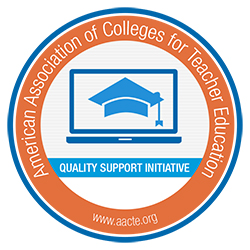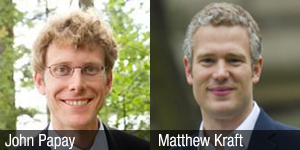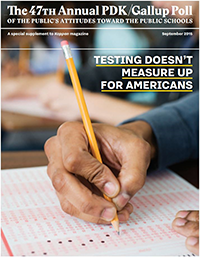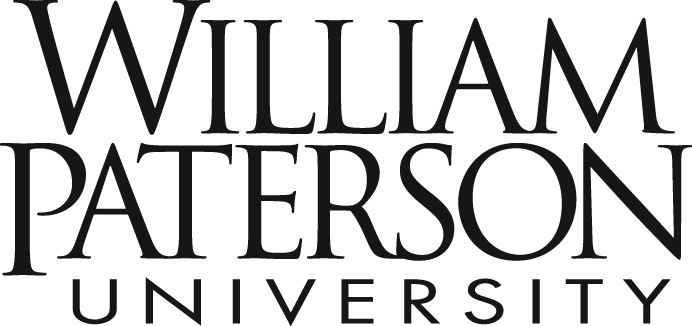29 Sep2015
By Sharon Leathers and Nanette Missaghi
New data illuminate the growing problem of the lack of diversity in the teacher workforce and reframe teacher diversity as an “educational civil right” for students. The Albert Shanker Institute’s recent report on The State of Teacher Diversity in American Education names teacher diversity as a crisis in the educator workforce—the very topic being addressed by the 10 institutions participating in a Networked Improvement Community (NIC) sponsored by AACTE. Specifically, AACTE’s effort seeks to identify strategies to boost the number of Latino and Black men in the education profession.
The authors of the Shanker report studied research and data on teacher diversity from 1987 to 2012 in nine cities in the United States. The report shows that for the period of 1987-2012, the percentage of the students of color changed from 23% to 37% (a 14 percentage point increase). For the same period, the percentage of teachers of color rose from 12% to 17%—a mere 5 percentage point increase. This shows that the rate of increase of students of color is far (almost three times) greater than the increase in the percentage of teachers of color. Therefore, this is a crisis not only in the decline of numbers of young people seeking education careers, but the absence of young people of color choosing the profession at the same rates as the number of students of color enrolled in the nation’s schools.
28 Sep2015
By Hannah Maes

Have you tried AACTE’s Online Professional Seminars (OPSs) yet? Trish Parrish, assistant vice president of academic affairs and professor of education at Saint Leo University (FL), has completed three already! Here’s what she had to say when I recently asked her about the experience with AACTE’s Quality Support Initiative.
When Parrish started working on her first OPS, her husband was confused to see her in the student’s role. “He said, ‘But you’ve already prepared all your classes for tomorrow!’ And I replied, ‘Well, yes, but now I am taking my class!’ ” In fact, the time commitment on top of her already-full workload had Parrish worried at first, but she decided to give it a try—and now she has completed the first three OPSs in AACTE’s series. “I’ve definitely enjoyed it,” she says.
23 Sep2015
By Sungti Hsu

As your state chapters plan fall and spring conferences, executive retreats, and other meetings, please keep in mind that AACTE staff are available to serve as speakers and presenters at meetings around the country.
15 Sep2015
By Guneev Sharma

Research out of Brown University (RI) shows that teachers improve tremendously in their first year of teaching and continue to do so during their career. Researchers John Papay and Matthew Kraft discussed this work in a free AACTE webinar last month, “Toward a Broader Conceptualization of Teacher Quality: How Schools Influence Teacher Effectiveness,” which was recorded and is now available in AACTE’s Resource Library.
Papay, assistant professor of education and economics, and Kraft, assistant professor of education, shared findings from their research, recently published in Productivity Returns to Experience in the Teacher Labor Market: Methodological Challenges and New Evidence on Long-Term Career Improvement and Can Professional Environments in Schools Promote Teacher Development? Explaining Heterogeneity in Returns to Teaching Experience. These studies show that teachers’ learning develops exponentially in their early years in the classroom but also continues to grow throughout their careers at a slower rate, and teachers working in more supportive professional environments improve their effectiveness more over time than teachers working in less supportive contexts.
01 Sep2015
By Sharon Robinson
This post also appears on the Public School Insights blog of the Learning First Alliance.
Educators from PK-12 schools and higher education share the goal of preparing preservice teachers in a way that develops candidates’ skills, contributes positively to student growth, and stimulates mutual renewal of schools and collegiate preparation programs. The conception of clinical experience as a few weeks of student teaching not only is antiquated but runs counter to our professional commitment to quality. Instead, today’s preparation programs are nurturing complex clinical partnerships with yearlong residencies or internships that both produce beginning teachers who are practice-ready and support a process that strengthens the schools’ capacity to deliver high-quality education for their students.
25 Aug2015
By Jerrica Thurman

AACTE’s more than 800 member institutions are dedicated to high-quality preparation that ensures the effectiveness, diversity, and readiness of professional educators, supporting the priorities of the American public surveyed in the 47th annual PDK/Gallup Poll of the Public’s Attitudes Toward the Public Schools. The recently released 2015 poll included questions on teacher quality and evaluation, standards, testing, and more, and a new online polling format captured selected demographic information, allowing for more disaggregated responses than past surveys.
The survey shows that 95% of Americans consider the quality of teachers to be very important and an integral factor for improving public schools. As in past years, an overwhelming majority of the U.S. public also is pleased with the performance of their local schools. Testing is viewed less favorably, though, including for teacher accountability purposes; 55% of Americans and 61% of public school parents oppose using student scores on standardized tests as part of teacher evaluations. Respondents also are skeptical of federal policy influences on public schools and of the Common Core State Standards.
07 Aug2015
William Paterson University of New Jersey to Pilot Expansion to Undergraduate, Master’s Students
By Rodrick Lucero and Omar Davis
 AACTE is expanding the AACTE Holmes Scholars® doctoral-level program to also support underrepresented students at earlier stages of their education careers. Beginning this fall, William Paterson University in Wayne, New Jersey, will pilot the new programs for undergraduates and master’s-level students to help diversify the education workforce.
AACTE is expanding the AACTE Holmes Scholars® doctoral-level program to also support underrepresented students at earlier stages of their education careers. Beginning this fall, William Paterson University in Wayne, New Jersey, will pilot the new programs for undergraduates and master’s-level students to help diversify the education workforce.
Currently, participation in the Holmes Scholars Program is open to all AACTE member institutions with doctoral programs in education. The newly expanded Holmes Program will reach high school students through the Holmes Cadets Program, undergraduates through the Holmes Honors Program, and master’s-level students through the Holmes Master’s Program. The peer network will continue to feature prominently across all levels, with doctoral Holmes Scholars mentoring Master’s and Honors students just as the scholars benefit from mentoring through the alumni network.
04 Aug2015
By Jerrica Thurman

AACTE is undertaking a new effort to strengthen its Innovation Exchange by developing better navigation tools, adding fresh resources, and boosting engagement opportunities for the professional community.
“The Innovation Exchange must be an interactive platform for bringing together and amplifying the innovative work our members do,” said Rodrick Lucero, vice president of member engagement and support.
04 Aug2015
By Jerrica Thurman
From their recent research on the relationship between teacher productivity and job experience, John Papay and Matthew Kraft of Brown University (RI) will share new evidence on teachers’ long-term career improvement in a free webinar for AACTE members. “Toward a Broader Conceptualization of Teacher Quality: How Schools Influence Teacher Effectiveness” will be held Wednesday, August 19, at 2:00 p.m. EDT.
Policy makers tend to think of “teacher quality” as a fixed and portable characteristic of an individual teacher – in other words, it doesn’t change over time or across school settings. In this webinar, Papay and Kraft will make the case for a broader conceptualization of “teacher effectiveness” that depends, in large part, on the school context in which a teacher works.
21 Jul2015
By Walter H. Gmelch
Today the development of leaders in our society is at a critical junction—too important to leave to chance. While the corporate world laments that its leadership development has progressed only from the Bronze Age to the Iron Age, I fear that many colleges and universities are still in the Dark Ages. In the educator preparation field, though, the AACTE Leadership Academy—for which I’ve been privileged to serve as a faculty member—helps illuminate the way for department chairs and deans to enter the Building Age of academic leadership.
26 Jun2015
By Jerrica Thurman
AACTE issued a press release June 24 announcing a new Clinical Practice Commission, which has already begun working on an ambitious agenda to better define what constitutes high-quality clinical teacher preparation. Read on to learn more, or contact Vice President Rodrick Lucero, who chairs the commission, for more information.
19 Jun2015
By Melissa M. Burnham
Last week, Nevada Governor Brian Sandoval signed into law Senate Bill 511, which establishes the Teach Nevada scholarship for students interested in completing PK-12 educator preparation programs throughout the state. Sponsored by Governor Sandoval and passed by the State Assembly on the last day of the 2015 session of the Nevada legislature, this bill devotes $2.5 million to student scholarships in each year of the coming biennium. An additional appropriation of $5 million per fiscal year provides funding for Nevada districts to provide financial incentives for new teacher hires.
09 Jun2015
By Sharon Robinson
Professional advocacy organizations support their members by helping them advance a collective voice. By articulating a field’s consensus positions, associations empower their members to speak clearly about what they know, identify priorities, invest their energy strategically, and communicate confidently with internal and external audiences.
These unified understandings, which we adjust as research and best practices evolve, help us fulfill our obligation to correct misinformation and to respond to critics—a frequent need in the field of educator preparation. More importantly, though, they provide a foundation for action by the profession and help us recognize areas of need. In educator preparation, we’ve instituted a variety of reforms in recent years that have prompted us to develop new resources to increase our capacity, assess our progress, and inform our knowledge base.
26 May2015
By Mark LaCelle-Peterson

I am delighted to announce AACTE’s new Quality Support Initiative, which is designed to provide resources and support to educators interested in assessment and accreditation. Starting next month, we will offer Online Professional Seminars (OPSs) for faculty at AACTE member and nonmember institutions, undergraduate and graduate students, PK-12 teachers—or anyone involved in educator preparation.
As part of our mission to advocate and build capacity for high-quality educator preparation, AACTE has established this initiative to support the profession’s work in continuous improvement and accreditation. The OPSs provide professional development for individuals and promote organizational development for institutions in a convenient, flexible format.
01 May2015
By Mark Ginsberg
I am honored to assume the role of chair of AACTE’s Board of Directors at such an exciting time for the organization and the profession as a whole. Nine weeks into my yearlong term, I’m eager to share my excitement with you about the work we’re doing together.
Most visible so far is our focus on accreditation, particularly our efforts to initiate a collaborative dialogue with the Council for the Accreditation of Educator Preparation (CAEP). This dialogue aims to address concerns expressed by many AACTE members while continuing our support for CAEP as the field’s unified accrediting body.
Although important—in fact, critical—for our field, our work with CAEP is but one of a large portfolio of topics on AACTE’s agenda.










 AACTE is expanding the AACTE Holmes Scholars® doctoral-level program to also support underrepresented students at earlier stages of their education careers. Beginning this fall,
AACTE is expanding the AACTE Holmes Scholars® doctoral-level program to also support underrepresented students at earlier stages of their education careers. Beginning this fall, 